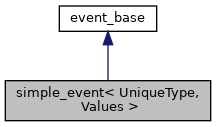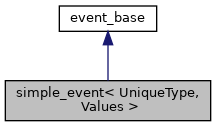 |
libfilezilla
|
 |
libfilezilla
|
This is the recommended event class. More...
#include <event.hpp>


Public Types | |
| typedef UniqueType | unique_type |
| typedef std::tuple< Values... > | tuple_type |
Public Member Functions | |
| template<typename First_Value , typename... Remaining_Values> | |
| simple_event (First_Value &&value, Remaining_Values &&...values) | |
| virtual size_t | derived_type () const override |
| Simply returns type() | |
| event_base ()=default | |
| event_base (event_base const &)=default | |
| event_base (event_base &&)=default | |
 Public Member Functions inherited from event_base Public Member Functions inherited from event_base | |
| event_base (event_base const &)=default | |
| event_base & | operator= (event_base const &)=default |
| event_base (event_base &&)=default | |
| event_base & | operator= (event_base &&)=default |
Static Public Member Functions | |
| static size_t | type () |
| Returns a unique id for the type such that can be used directly in derived_type. | |
Public Attributes | |
| tuple_type | v_ |
| The event value, gets built from the arguments passed in the constructor. More... | |
This is the recommended event class.
Instantiate the template with a unique type to identify the type of the event and a number of types for the values.
Keep the values simple, in particular avoid mutexes in your values.
|
mutable |
The event value, gets built from the arguments passed in the constructor.
You don't need to access this member directly if you use the dispatch mechanism.